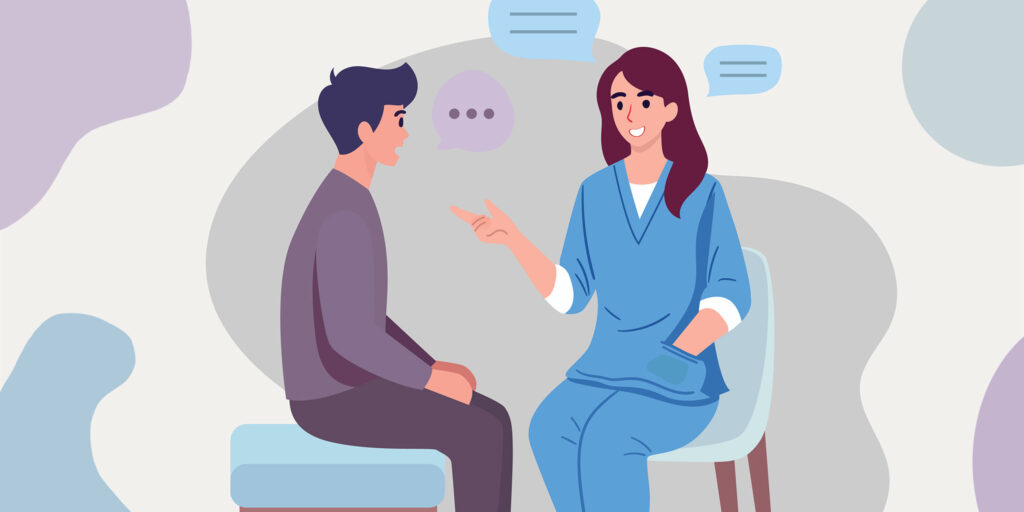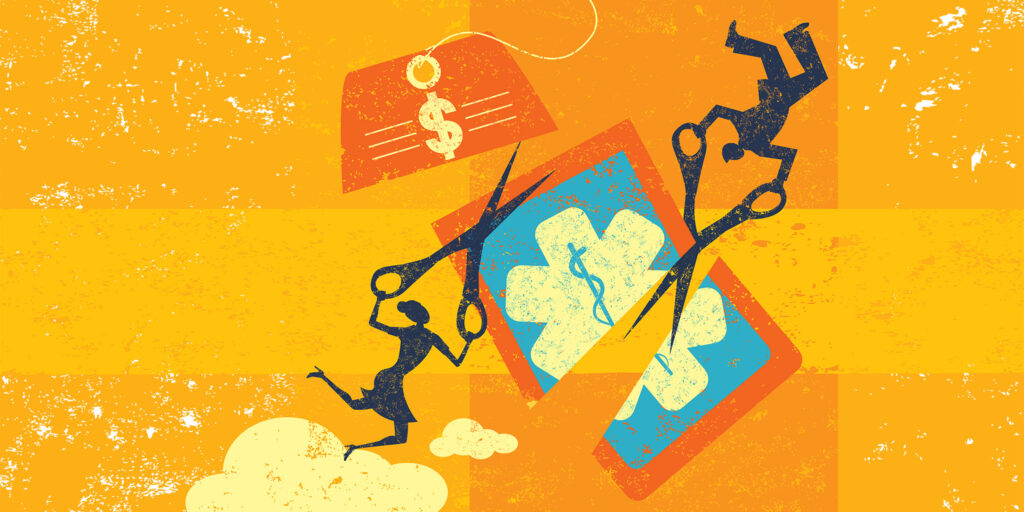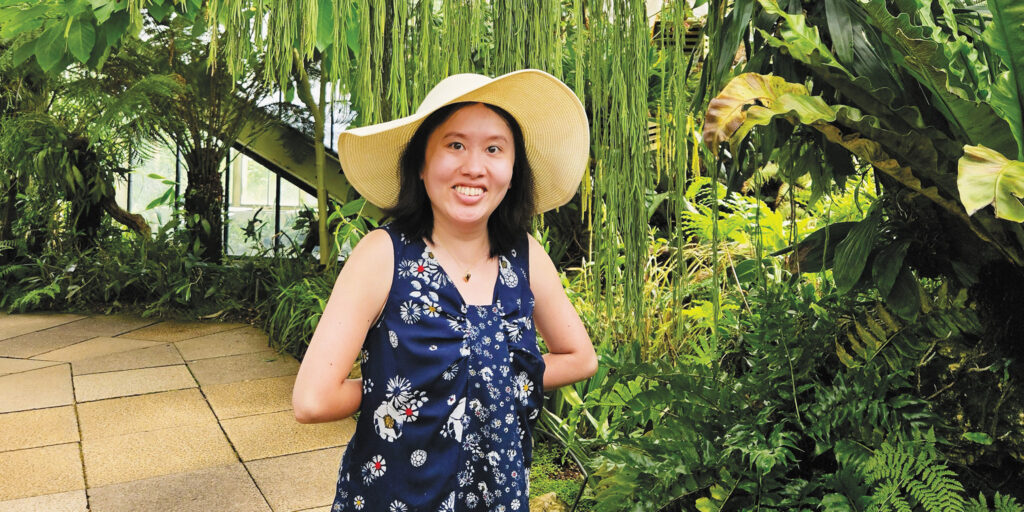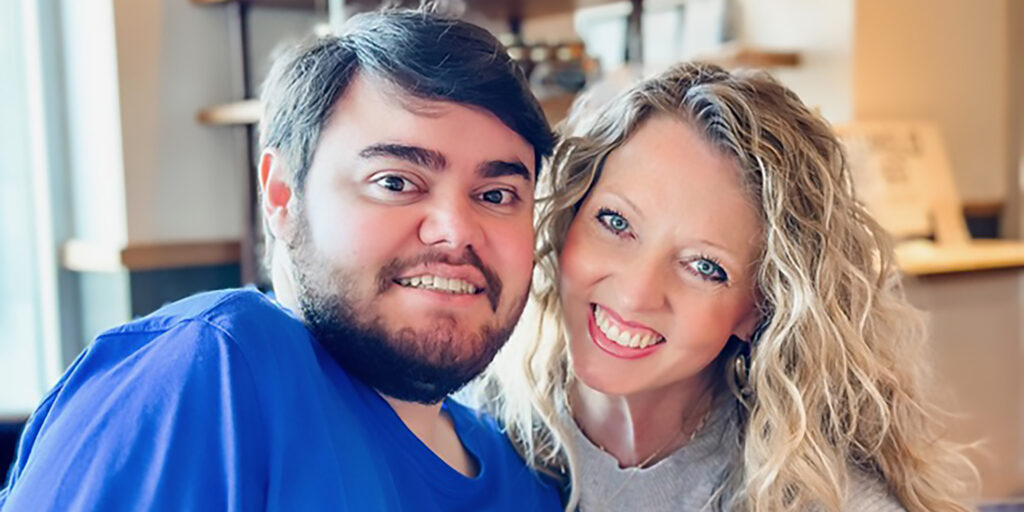
The Hidden Power of Self-Care in Caregiving
By Rene Ryan | Friday, November 14, 2025
5 Second Summary
Four family caregivers candidly share the everyday ways they incorporate self-care into their lives, so they can continue to give their best to their loved ones.
Caregivers often give so much of themselves that sometimes their own needs fade into the background. Yet the stories shared here reveal a powerful truth: Caring for yourself is not selfish — it’s essential.
Each of the caregivers featured here has learned that strength is built in the pauses — a moment of quiet, a trusted partner’s support, a laugh with friends, or a creative outlet that reconnects them to their identity.
Their wisdom reminds us that resilience doesn’t come from pushing endlessly forward, but from intentionally carving out space to breathe, reflect, and reconnect. They show us that by honoring our own well-being, we not only sustain ourselves — we deepen our capacity to care for the ones we love.
Christie West: Taking a minute, writing it out, leaning on community
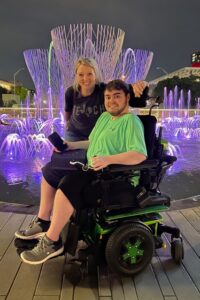
Christie West and Zach enjoy activities and service projects.
When Christie talks about self-care, she doesn’t just mean something fun and relaxing. She means the gritty, practical work of pausing, processing, and plugging into people, so she can keep showing up for her 28-year-old son, Zach. She adopted Zach, who lives with Duchenne muscular dystrophy (DMD), when he was 3 years old.
First, she gives herself permission to “take a minute.” In moments when emotions run high, Christie reminds herself of a simple mantra: Emotions are normal. I just need a minute. For caregivers, she says, a brief reset is not indulgence — it’s maintenance. Sometimes it’s a hallway cry, sometimes it’s 10 minutes with an audiobook, praise music, or even tidying a pantry — anything small that restores a sense of control when so much feels uncontrollable. She schedules those minutes like meetings: short, protected blocks of time when she can focus on herself.
Second, she journals and invites Zach to do the same. “Your brain doesn’t know the difference between talking to someone and writing it out,” she explains. When anxiety swells, the page becomes a pressure valve. Journaling also serves as a tool to prepare for conversations: Dump it in the notebook first, then let’s talk about what is left to process. That rhythm lightens the emotional load and makes the conversation calmer and clearer.
Finally, Christie insists on community. Healing accelerates when she’s among people she has a connection with, whether that’s fellow MDA Ambassadors, Miracle League baseball teammates, teachers, counselors, or volunteers at the animal shelter. She also ensures Zach has community. With MDA Advocacy trips to Washington, DC, online connections, and service projects, Zach experiences himself as a person with purpose. That experience feeds Christie, too.
Her playbook is simple, though not easy: take a minute, write it out, don’t go it alone. In those small, consistent choices, a caregiver’s strength is replenished, and love has room to keep doing its quiet, extraordinary work.
Karen Clough: Gardening, art, laughter, and pool time
For Karen, self-care isn’t complicated or time-consuming; it’s a string of small, sensory pauses that make the day more enjoyable.
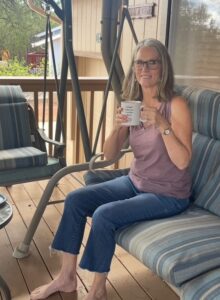
Karen Clough relaxes on her patio.
Most mornings start on the patio with coffee, prayer, Bible reading, birdsong, and her desert garden. She crushes a sprig of basil between her fingers, breathes in the sharp, green scent, and feels a sense of peace. Tending to plants gives her something tangible to nurture and watch grow, a comforting counterbalance when so much about her husband, Doug’s, amyotrophic lateral sclerosis (ALS) diagnosis resists control.
Inside her home, Karen keeps an upstairs corner stocked with watercolor supplies. Taking a half hour to draw or paint is enough — a quiet pocket where she is a learner again, not just a planner and problem-solver.
Some days, she opens her laptop to join a Zoom laughter yoga class, led by a certified laughter yoga leader and health coach. It’s simple by design: breathing, using physical sensations to anchor yourself in the moment, and, yes, laughing at silly prompts until the mood lifts. She loves the science of it (the body gets the same boost from a practiced laugh as a spontaneous one), but mostly she loves how it resets her mind. In 30 minutes, her shoulders drop; the list can wait.
Some of Karen’s best self-care happens along with Doug. Thanks to donated pool equipment and a bit of ingenuity, he can transfer into their backyard pool. In the water, his body feels lighter; they float, talk, and relax. It’s a cooling relief from the Arizona heat — and an emotional one, too. The pool is where they move together, laugh with grandkids, and feel a slice of normal.
None of this erases the responsibilities of caregiving, or the vigilance. But it brings joy on ordinary days: a hummingbird at the feeder, a wash of color on paper, a chorus of giggles on Zoom, the buoyancy of shared water. These small rituals don’t just pass the time — they restore the part of her that keeps choosing patience, presence, and hope.
Gavin Beeker: Cooking, reading, and welcoming others in
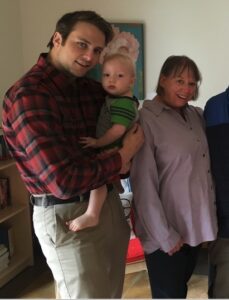
Gavin Beeker and Ranae welcome family into their home.
Gavin, 38, didn’t plan on becoming a full-time caregiver, but when his mom, Ranae, 67, who lives with facioscapulohumeral muscular dystrophy (FSHD), took a dangerous fall, he sold his house and moved in. What followed is what he describes as a 24/7 role overseeing morning routines, meals, meds, and household logistics, with breaks woven around Ranae’s volunteer work and frequent visits from extended family and friends.
Their house became a hub. And in that busy orbit, Gavin found a self-care rhythm that keeps him steady: reading, learning a new language, cooking, and welcoming people to the table.
Cooking is where he exhales. It’s tactile, creative, and finishable — an antidote to the open-endedness of caregiving. Food gives him a way to contribute something beautiful and concrete on days when little else feels within his control.
Reading offers a different refuge. He’s teaching himself to read German — slowly, deliberately — because the challenge engages his mind and reminds him that growth is still happening, even when the body has limits.
Entertaining ties it all together. Hosting is not just social; it’s therapeutic. A full living room means Ranae laughs more, and Gavin feels less alone. The conversation, the clink of cups, the easy coming and going — it restores them both.
The path here wasn’t linear. After his own emotional struggles, Gavin sought therapy that helped him build healthier coping tools. That reckoning became a turning point.
And although he shares the same diagnosis as his mom, who is passionately involved in MDA advocacy, he prefers the quiet dignity of learning and craft — pursuits that reinforce self-worth even as the body changes.
His self-care isn’t grand or rarefied. It’s soup on the stove, a paragraph in a new language, a door open to family. In that everyday hospitality, Gavin protects his stamina and keeps the home warm and welcoming.
Lillie Cleeton: Strength in support, teaching, and advocacy
For Lillie, caregiving has been a lifelong role that she shares with her husband, Ken. Their son, KL, was diagnosed with spinal muscular atrophy (SMA) as an infant and now, at 36, requires full-time caregiving. For many years, Lillie poured herself entirely into the work — overnight shifts, full days of balancing a job and being “everything for everyone.” It wasn’t until her own health broke down that she realized how unsustainable that approach was.
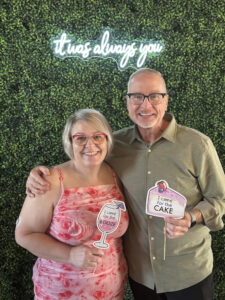
Lillie and Ken Cleeton take time to laugh and recharge.
Today, she talks openly about the lessons she learned the hard way. “If you don’t take care of yourself, it will catch up with you,” she says. “I hurt myself physically, emotionally, and mentally because I thought I couldn’t stop.”
That realization now fuels her work training other caregivers in Illinois. As an instructor through the Member Education Training Center, she urges them to pause, even if just for five minutes. “Take a breath, take a walk, go to a movie, get your nails done — something that’s just for you. Because if you don’t, you won’t be able to keep going,” she says.
She credits Ken as the “rock” who makes it possible to keep going. He handles much of the physical lifting, and his steady presence anchors their family. Friends, too, play an important role, offering weekends away to see grandchildren or simply time to laugh and recharge.
Lillie admits the guilt of stepping away never fully disappears, but she now knows breaks are not optional — they’re survival.
Adding inspiration is KL himself. He thrives as a professional poker player and an MDA advocate, with a girlfriend and a community of peers who push him forward. Watching him live fully, chase opportunities, and speak out for others gives Lillie and Ken fresh courage.
Her advice is simple, born of experience: choose your hard, choose to laugh, and above all, choose to care for yourself, so you can keep caring for the ones you love.
Quick Tips From Caregivers
Simple ways to protect your energy while caring for others:
- Take breaks. Even 5-10 minutes to breathe, pray, or reset can make the day better.
- Write it out. Journaling helps process emotions and lighten the mental load.
- Get creative. Whether trying a new recipe, painting, or learning a new language, creative outlets restore balance.
- Lean on your people. Family, friends, and peer groups provide perspective and laughter. Don’t go it alone.
- Teach and share. Helping other caregivers reinforces the importance of your own self-care.
- Laugh often. Join a group, tell stories, or just practice a laugh — the brain feels the benefit either way.
- Step outside. Gardens, patios, fresh air, and sunshine refresh body and spirit.
- Move together. Shared activities — like floating in a pool or cooking as a family — bring joy and connection.
- Remember: You matter. Caring for yourself is not shirking caregiving — it’s what makes it possible.
Next Steps and Useful Resources
- Discover more tools and resources for managing caregiver stress and coping with fatigue.
- Check out MDA’s list of caregiver resources.
- Read 7 Essential Tips for Family Caregivers to Avoid Common Injuries
- Stay up to date on Quest content! Subscribe to Quest Magazine and Newsletter.
Disclaimer: No content on this site should ever be used as a substitute for direct medical advice from your doctor or other qualified clinician.


